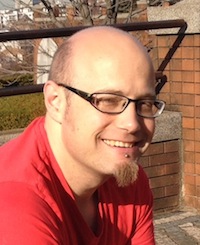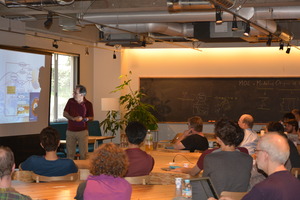ELSI Blog
62 Scientific Speed Dating
 How does one take a group of researchers from disparate fields and, in the space of a few days, have them working together towards a common goal?
How does one take a group of researchers from disparate fields and, in the space of a few days, have them working together towards a common goal?
At the time of writing, we're in the middle of a five-week workshop entitled "Modelling the Origins of Life" that I'm co-organising along with Piet Hut and Nicholas Guttenberg. The first two weeks are held at ELSI, July 21 - August 1, while the next three weeks will held in Kobe, at the Center of Planetary Science, sponsored by RIKEN, next door to RIKEN's K computer.
The workshop's goal is to build a community around a new idea. Fields such as artificial life, ecology and theoretical biology have long histories of studying life in terms of general principles rather than the specifics of particular species. The idea as I currently understand it is to apply and extend these techniques, along with contributions from other fields such as systems chemistry and abstract mathematics, so that we can study not only the nature of life as a finished product, but also the processes that might lead to its emergence.
As a scientific project this is fascinating, but since very little work has been done in this area it also raises an interesting sociological question: how can we build a community around it? We didn't want the workshop to have the usual format based around presentations and panel discussions. Rather, we wanted to take a group of researchers from fields as diverse as systems chemistry, artificial life and abstract mathematics, and in the space of a few weeks have them actually working together on brand new scientific projects.
In my youth I used to act in plays as a hobby. (I'm mentioning this for a reason; bear with me.) Acting is a lot more than just learning lines; one must also work with the other actors in a peculiarly intimate way. When rehearsing for a play one spends only a small proportion of the time practicing specific scenes, and most of that is towards the end of the time table. The rest is spent on games and exercises that are designed to break down the inhibitions and social barriers between the actors, so that when they finally take to the stage they can react naturally and fluidly to one another's characters.
The development of new scientific ideas seems somehow similar to the development of characters in a play; really working with someone requires the ability to interact with them fluently, and this is something we can make a conscious effort to incubate. Of course, it wouldn't make sense to get a group of scientists to stand in a circle and do stretches and vocal exercises, but I wondered if there was a way to achieve a similar effect on a more intellectual level.
What we did in the end was something we call "scientific speed dating." This is an idea that originated at the Ikegami lab at the University of Tokyo, where I'm currently working as a post-doc. The idea is that everyone is given a sheet of A1 paper and a few felt tip pens, and spends 15 minutes designing a poster. Once this is done, we split into two groups and pair up, with group 'A' standing at their posters, and one member of group 'B' visiting each one. These pairs of people then have just three minutes to discuss the poster until a bell rings and each member of group 'B' moves to the next poster. This is repeated until everyone's seen every poster, and then the two groups switch roles and the whole thing repeats again.
Fifteen minutes designing a poster is enough to get a rough idea across, but it's not long enough to be a perfectionist. Three minutes isn't long enough to finish a conversation, but it's enough to start one, which is what counts. As an exercise it gets everyone "warmed up" and into the mindset of engaging in discussions; it introduces people who don't know each other, and it gives people a chance to show off ideas or ask questions that wouldn't necessarily arise in a group context.
I was worried at first that people might not like having to play a kind of game instead of doing something more serious, but in the end everyone had a great time, and many told me they really appreciated the idea. I knew it had been successful when I looked at the room after the exercise had finished, and saw everyone bunched together into little groups, excitedly discussing each other's ideas. I hope that this little game has played a role in forming a successful and lasting community, and might thus have made some indirect contribution to the question of life's origins.











